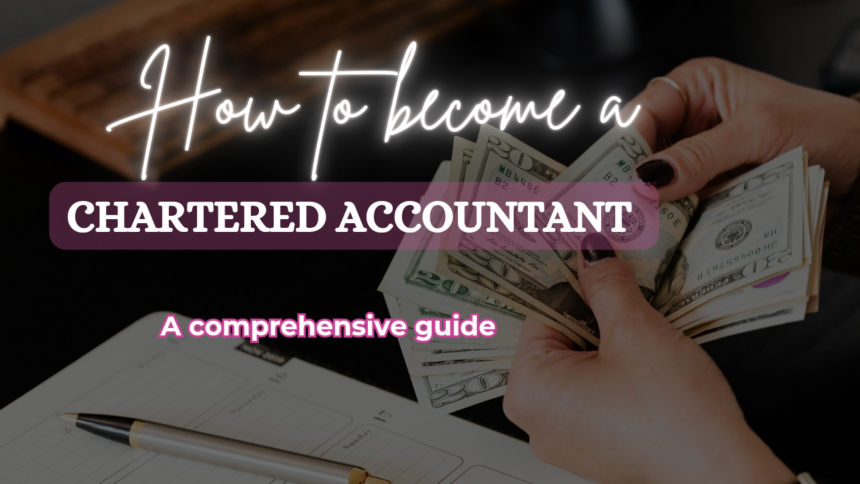Chartered accountant Chartered Accountancy (CA) is one of India’s most respected professions, with rewarding and profitable opportunities in finance, accounting, and taxes.
Becoming a CA necessitates great devotion, constant hard work, and a systematic strategy, as the process includes numerous levels of tests and practical training.
Here is a complete step-by-step approach to become a chartered accountant in India.
Who is a Chartered accountant?
A Chartered Accountant (CA) is a qualified professional who works in accounting, taxes, auditing, financial management, and corporate law.
CAs help businesses and organizations make decisions, organize their finances, and ensure regulatory compliance.
Their knowledge spans several fields, including cost accounting, budget planning, investment advising, and forensic auditing.
As a CHARTERED ACCOUNTANT aspirant do check: ICAI

Eligibility criteria to start your chartered accountant journey
The Institute of Chartered Accountants of India (ICAI) manages two major entrance channels for beginning a Chartered Accountancy degree in India.
After Class 12 (Foundation Route)
Students who have finished Class 12 in any stream (Commerce, Science, or Arts) can enroll in the CA Foundation course.
A minimum of 50% in Class 12 is recommended, while students with a Commerce background find it simpler to understand the concepts.
After graduation (Direct Entry Route)
Commerce graduates with 55% or more grades and non-commerce graduates with 60% or more marks can attend the Intermediate course without first completing the Foundation level.
This method is especially beneficial for students who decide to pursue CA later in their academic careers.
Levels in the chartered accountant course
The CA course is divided into three levels, each with its own qualifying requirements, material, and tests.
CA Foundation level
The Foundation level is the entrance point for students starting the CA course following Class 12.
It gives the framework for comprehending fundamental ideas in accounting, law, and economics.
Key Details
Registration: You must register at least four months before taking the CA Foundation test.
Exams frequency: are held twice a year, in May and November.
Subjects:
- Fundamentals and Practices of Accounting
- Business laws, correspondence, and reporting.
- Business Math, Logic, and Statistics
- Business Economics, Business, and Commercial Knowledge
Criteria for passing: Each topic must receive at least 40% of the possible marks.
Aggregate of 50% or above in all disciplines combined.
CA Intermediate
The Intermediate level is the following step after passing the Foundation test or enrolling right after graduation.
This level features a detailed syllabus separated into two sections.
Key details
Registration: You may register after completing the Foundation test or through the Direct Entry Route.
Exams are conducted twice a year (in May and November).
Subject: Group 1:
- Accounting.
- Corporate and Other Laws.
- Cost and Management Accounting.
- Taxation.
Group 2
- Advanced accounting.
- Audits and Assurance
- Enterprise Information Systems, Strategic Management
- Financial Management and Economics in Finance
Passing Criteria: Each topic requires a minimum of 40%. An aggregate of 50% or more in one or both groupings.
CA Final
The CA Final is the final and most difficult stage of the race.
It covers advanced ideas in financial reporting, management, and taxation.
Key details:
Eligibility: Pass both Intermediate level groups and finish Articleship training (details provided below).
Exams are conducted twice a year (in May and November).
Subject: Group 1:
- Financial Reporting.
- Strategic Financial Management.
- Advanced Auditing and Professional Ethics.
- Corporate and Economic Laws.
Group 2:
- Strategic Cost Management and Performance Evaluation.
- Elective Paper (e.g., Risk Management or Financial Services)
- Direct Taxes and International Taxation
- Indirect Taxation Laws
Passing Criteria: The same as at earlier levels, with 40% for each topic and 50% for the group.
Articleship training
What is articleship?
Articleship is three years of practical training under a professional Chartered Accountant.
It is an essential component of the CA course since it gives real-world experience and practical knowledge.
Key points
Articleship begins after completing one or both Intermediate level groups.
It provides hands-on expertise in auditing, taxation, compliance, and financial management.
You are given a stipend throughout your articleship, which varies according on your region and the CA company.
Benefits of Articleship
Improves your comprehension of the practical applications of academic knowledge.
It prepares you for the professional problems that you will encounter as a CA.
Creates networks and mentorship possibilities in the business.
Integrated and Advanced Courses (ICITSS and Advanced ICITSS)
ICAI requires CA students to complete the following training programs:
Integrated Course of Information Technology and Soft Skills (ICITSS): Mandatory prior to beginning articleship.
Covers fundamental IT and communication skills.
Advanced ICITSS: Conducted before taking the CA Final test.
Concentrates on innovative IT technologies and professional ethics.
Duration for Chartered Accountant
The time required to finish the CA course varies on your entrance point.
Foundation Route: 4.5-5 years.
Direct Entry: 3.5-4 years.
This involves passing tests, completing articles, and meeting other ICAI standards.

Tips for Success on the chartered accountant
Strong Foundation: Prioritize developing a thorough comprehension of ideas at the Foundation and Intermediate levels.
Time Management: Set up specific time for study, revision, and practice.
Consistent Practice: Solve old papers and practice examinations to better grasp the exam style and time management.
Stay Current: Keep up with changes in taxation and accounting requirements.
Seek Guidance: If necessary, learn from mentors, elders, and coaching institutions.
Career Opportunities after becoming chartered accountant
Once you become a CA, your job opportunities are numerous and diversified. Some of the frequent roles are:
- Auditor: Conduct audits on firms to guarantee compliance with legislation.
- Tax Consultant: Assist customers with tax planning and returns.
- Financial Advisor: Focus on investment techniques and wealth management.
- Corporate Jobs: Positions such as CFO, Finance Manager, or Compliance Officer in major corporations.
- Government Sector: Opportunities in income tax, GST, or public-sector enterprises.
- Independent Practice: Establish your own accounting business or consulting services.
Conclusion
Becoming a Chartered Accountant in India is a tough but rewarding experience.
It necessitates effort, patience, and a solid understanding of academic and practical concepts.
Once qualified, CAs command enormous respect and opportunity in the financial sector, making the work worthwhile.
With a disciplined approach and constant hard work, you may realize your ambition of becoming a CA.
Also check: how to protect yourself from social media scams









